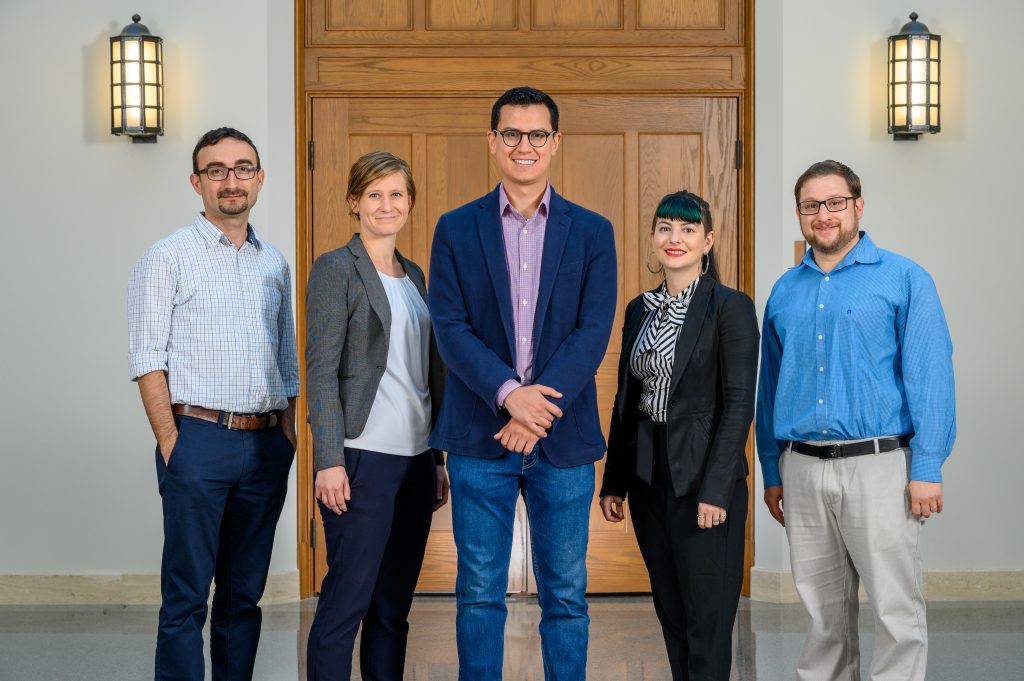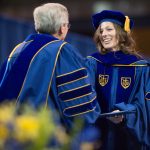Photo: New Keough faculty members Patrizio Piraino, Rachel Sweet, Alejandro Estefan, Ashley Bohrer, Joshua Eisenman
The Keough School of Global Affairs at the University of Notre Dame has appointed five new faculty members who bring diverse expertise in gender and peace studies, development economics, global education, international political economy, policy, and armed conflict.
“Befitting the Keough School’s mission and ambitions, each member of this new cohort of faculty brings expertise that is both international in focus and global in scope,” said Scott Appleby, Marilyn Keough Dean of the Keough School.
“Whether the topic is US-China relations, resource-driven conflict in Africa, the economics of poverty and poverty reduction, inclusive educational policy in developing countries, or intersectional justice, these scholars’ cutting-edge research carries direct implications for policy as well as practice.”
The new faculty—Ashley Bohrer, Joshua Eisenman, Alejandro Estefan, Patrizio Piraino, and Rachel Sweet—bring extensive international teaching and field research experience to the Keough School, which opened its doors in 2017.
Ashley Bohrer, assistant professor of gender and peace studies, is a core faculty member of the Kroc Institute for International Peace Studies, part of the Keough School. She also is a concurrent faculty member in Notre Dame’s Gender Studies program.
Bohrer, who holds a PhD in philosophy from DePaul University, studies complex patterns of oppression based on race, gender, sexuality, and class, focusing on the intersections of these varieties of injustice. She is the author of Marxism and Intersectionality: Race, Gender, Class, and Sexuality under Contemporary Capitalism. Bohrer has studied and taught around the world, including in France, Germany, Lebanon, China, South Africa, and Sweden. During the fall 2019 semester, she is teaching a peace studies seminar for undergraduates.
Joshua Eisenman, associate professor of global affairs, studies the political economy of China’s development and China’s foreign relations with developing countries, especially those in Africa. After extensive field work in China, he authored Red China’s Green Revolution: Technological Innovation, Institutional Change, and Economic Development Under the Commune and co-edited China Steps Out: Beijing’s Major Power Engagement with the Developing World. He holds a PhD in political science from the University of California, Los Angeles.
A respected expert in policy circles who speaks fluent Mandarin Chinese, Eisenman is regularly consulted by US policymakers on Capitol Hill, in the government’s executive branch, and in the US military. He has served as senior fellow for China studies at the American Policy Council since 2006. In the classroom, Eisenman will teach courses such as China and the World, US-China Relations, and Foreign Policymaking in a Global Age.
Alejandro Estefan, assistant professor of global affairs, studies economic development with the goal of informing policy decision-making. Estefan studies many essential topics in the field of development economics, including the factors that lift individuals out of poverty; the effects of public investments on education; female labor force participation and its impact on gender violence; and state capacity and tax revenue collection.
Estefan holds a PhD from University College London. He is a former research scholar at the Institute for Fiscal Studies in London and the Center for the Economics of Human Development at the University of Chicago, and has worked as a policy analyst for the Presidency of the Republic of Mexico. Estefan currently teaches Poverty Policy, a course that applies the tools of economic and public policy analysis to the study of poverty.
Patrizio Piraino, associate professor of education, labor, and development, is an applied microeconomist who focuses on global education, labor, and development, with emphasis on inequality, intergenerational mobility, and social exclusion.
Piraino, who holds a PhD in economics from the University of Siena in Italy, comes to Notre Dame from the University of Cape Town, where he was associate professor of economics. He has developed extensive expertise on issues related to global socioeconomic mobility, having studied data from several nations.
Piraino has collaborated with government agencies and the World Bank to evaluate how public services can promote youth work-readiness and employment. His most current research focuses on the impact of innovative post-primary education programs on socioeconomic mobility. During the spring 2020 semester, Piraino will teach a course on global education.
Rachel Sweet, assistant professor of global affairs, is a core faculty member of the Kroc Institute for International Peace Studies and a concurrent faculty member in the Department of Political Science.
Sweet’s research focuses on armed conflict, governance, and state capacity in fragile environments, and the methodology and data of studying civil wars and armed violence. She has conducted extensive field research in East and Central Africa. An Academy Scholar at the Harvard Academy for International and Area Studies at Harvard University, she holds a PhD in political science from Northwestern University.
Sweet bridges academic rigor with practical engagement to improve conflict policy. She has worked with the UN Office of the Secretary General-Special Envoy to the African Great Lakes, the United Nations Peacekeeping Mission, and as a lead conflict investigator with the British Foreign and Commonwealth Office. She also has been invited to present research findings to policymakers from the US Department of State, the United Nations, and various US intelligence agencies.
During the fall 2019 semester, Sweet is teaching a course on contemporary civil wars.
The Keough School of Global Affairs addresses some of the world’s greatest challenges, with particular emphasis on the design and implementation of effective and ethical responses to poverty, war, disease, political oppression, environmental degradation, and other threats to dignity and human flourishing.
In keeping with Notre Dame’s mission to place scholarship in service to the common good, the Keough School advances integral human development through research, policy and practice; transformative educational programs, and partnerships for global engagement.


